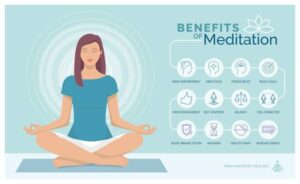Powerful Meditation Benefits – How to Start Your Meditation Practice.
Let’s talk about meditation and some Powerful Meditation Benefits, shall we? It’s been buzzing around like a bee in a garden lately, and for good reason. Meditation isn’t just for the monks or the yogis anymore; it’s for anyone looking to find a slice of serenity in the hustle and bustle of daily life.
Think of this as your friendly neighborhood guide to meditation, minus the confusing jargon. Whether you’re looking to drift off to sleep with meditation’s help or kick-start your day with a morning routine, we’ve got your back.
So, get comfy, it’s time to get your Zen on!
What Is Meditation?

Meditation Benefits, simply put, is the practice of turning your attention to a single point of reference. It could be your breathing, a certain feeling, or a word or phrase known as a mantra. In essence, it’s about living in the moment and awakening to life as it is.
But what is meditation beyond this basic definition?
Meditation Definition
Traditionally, meditation is rooted in the spiritual quest to understand the divine or deeper aspects of life. In modern terms, it’s often seen as a technique for mental hygiene – a way to clean out the mental clutter and calm the noise in our heads.
Think of your mind as a bustling city – thoughts are like the constant traffic, honking and rushing by. Meditation is like a quiet park in the heart of that city, a serene spot where you can sit and watch the world go by without getting caught up in the hustle.
So, when we talk about meditation, we’re referring to a broad array of practices that include techniques designed to promote relaxation, build internal energy or life force, and develop compassion, love, patience, generosity, and forgiveness.
A particularly ambitious form of meditation aims at effortlessly sustained single-pointed concentration, intended to enable its practitioner to enjoy an indestructible sense of well-being while engaging in any life activity.
As you settle into your meditation practice, you’ll find it’s less about doing something and more about doing nothing: not thinking, not exerting, not planning. Just being present and at peace with what is.
How Meditation Works

Ever wondered what’s going on in the head when people meditate? It’s not just about feeling Zen; there’s a whole lot of brain activity firing up. Let’s dive into the science behind meditation!
Science Behind Meditation
- Neuroplasticity and Gray Matter:
- Regular meditation is like a workout for your brain. It strengthens the brain’s ability to reshape and adapt. Research has shown that meditation increases the gray matter density in parts of the brain associated with memory, sense of self, empathy, and stress.
- A landmark study in 2011 by researchers at Harvard found that mindfulness meditation can actually change the structure of the brain: eight weeks of Mindfulness-Based Stress Reduction (MBSR) increased cortical thickness in the hippocampus, which manages learning and memory, and in specific areas of the brain that partake roles in emotion regulation and self-referential processing.
- The Amygdala and Stress Response:
- The amygdala, often referred to as the brain’s “fight or flight” center, is less activated and shows decreased gray matter density following meditation training. A 2013 study by Desbordes et al. demonstrated that after an eight-week course, participants showed a reduction in stress levels and amygdala activity when exposed to stress-inducing stimuli.
- Attention and Concentration:
- A slew of studies, including one from the University of Wisconsin in 2007, have found that meditation can enhance attention and concentration. It’s like a bicep curl for your brain, improving your brain’s ability to focus on tasks for longer periods without distraction.
- Default Mode Network and Mind-Wandering:
- The default mode network (DMN) is responsible for mind-wandering and self-referential thoughts – what’s often referred to as “being lost in thought.” Meditation has been shown to reduce activity in the DMN, and, importantly, when the mind does start to wander, those who meditate regularly are better at snapping back out of it.
- Functional Connectivity:
- Beyond increasing gray matter, meditation has been shown to enhance the connectivity between brain regions. A study from UCLA in 2012 found that long-term meditators had better-preserved brains as they aged, with more robust connections between different brain areas.
- Emotional Regulation and the Prefrontal Cortex:
- The prefrontal cortex, a part of the brain associated with maturity and regulation of emotions, becomes more active during meditation. This suggests that meditation supports emotional stability and resilience to stress.
- The Release of Beneficial Neurotransmitters:
- Meditation can promote the release of neurotransmitters, including serotonin, dopamine, and endorphins, all of which play a part in regulating mood and combating anxiety.
Also Check Out: 15 Inspirational Quotes to Motivate Your Fitness Journey
Meditation Benefits

Let’s dive into the benefits this age-old practice has for our mind, body, and soul.
Physical Benefits of Meditation
- Boosts Immune Health: Regular meditation can be like a vitamin for your immune system, helping your body to ward off illness with ease.
- Enhances Sleep Quality: Tossing and turning at night? Meditation for sleep can guide you into a deeper, more restorative slumber.
- Lowers Blood Pressure: By promoting relaxation, meditation can help keep the numbers on the blood pressure cuff in check.
Mental Benefits of Meditation
- Sharpens Focus: Incorporating morning meditation into your routine can lead to clearer thinking and improved concentration throughout the day.
- Reduces Stress: Like a mental massage, meditation melts away the stress, leaving you feeling lighter and more at ease.
- Fosters Creativity: Unleashing your inner artist; meditation can open the floodgates to creative thought and innovation.
Emotional Benefits of Meditation
- Builds Emotional Resilience: Life’s like a rollercoaster, and meditation helps you stay seated through the ups and downs.
- Cultivates Mindfulness: By practicing mindfulness through meditation, you can savor every bite of life, staying present and grounded.
- Enhances Self-awareness: Meditation invites you to a meeting with yourself, allowing for introspection and personal growth.
Remember, these aren’t just lofty promises; they’re the real deal—gifts of meditation that keep on giving. So why not grab a cushion, find a quiet spot, and see what meditation can do for you?
Types of Meditation

Meditation is a bit like cooking—there are countless ways to whip up a dish, each with its unique flavor. Similarly, meditation comes in various forms, each offering a distinctive experience for the mind and soul. Take a stroll with me.
-
Mindfulness Meditation:
- Originating from Buddhist teachings, this is the star of the meditation world. It’s about being present, observing your thoughts without judgment, and simply letting them float by like clouds in a serene sky.
-
Focused Meditation:
- If mindfulness is about observing, focused meditation is about zeroing in. It involves concentration on a single point—be it your breath, a candle flame, or a repeated word or sound, known as a mantra.
-
Movement Meditation:
- Think of yoga, tai chi, or even walking through a garden. Movement meditation combines gentle actions with mindful breathing, creating a flow state that’s both grounding and liberating.
-
Loving-Kindness Meditation:
- Also known as Metta meditation, it’s all about cultivating an attitude of love and kindness toward everything—even our foes and sources of stress.
-
Body Scan or Progressive Relaxation:
- Here, you’ll work through each part of your body, tensing and then relaxing muscles to release pent-up stress. It’s like sending your body on a luxurious, all-inclusive vacation.
-
Visualization Meditation:
- Close your eyes and picture a peaceful scene or goal. This type of meditation is a haven for the imagination and is often used to promote relaxation, peace, or personal aspirations.
-
Chakra Meditation:
- Rooted in Hindu and Buddhist traditions, this practice involves focusing on different energy centers in the body to tap into their power and harmonize your inner workings.
-
Transcendental Meditation:
- A deeper dive into the meditation ocean, TM is a form of silent mantra meditation, developed by Maharishi Mahesh Yogi. It requires training by a certified teacher, but devotees swear by its stress-busting powers.
Each of these practices can be a key to unlocking a more tranquil state of mind. But remember, the best type of meditation is the one that feels right for you—it’s a personal journey, after all.
Also Check Out: 7 Strategies for Building Effective Study Habits
Starting A Meditation Practice

Diving into meditation doesn’t require you to be a guru or to have a secret mantra. It’s about finding a moment for yourself in the day to pause and be present. Let’s walk through some simple steps to get you started.
Step 1: Find Your Spot
- Choose a quiet space where you won’t be easily distracted.
- Comfort is key, so whether it’s a chair, cushion, or your yoga mat, make sure it feels right.
Step 2: Set a Time
- Consistency is crucial. Pick a time of day when you can have a few uninterrupted minutes.
- Even just 5 minutes a day is a solid start.
Step 3: Adopt a Posture
- Sit with a straight yet relaxed posture. No need to twist into a pretzel—comfort leads to concentration.
- Keep your hands resting gently on your lap or knees.
Step 4: Close Your Eyes and Breathe
- Close your eyes and take a few deep breaths.
- Let the rhythm of your breathing guide you into a state of relaxation.
- Don’t think about anything, not even about not thinking anything.
Step 5: Focus Your Attention
- Choose a focal point—your breath, a sound, or even a silent mantra.
- When your mind wanders (and it will), kindly bring your focus back.
Step 6: Be Like an Ocean
- Don’t fret over distractions, keep your focus.
- Visualize your troubling thoughts as a drop in the ocean, insignificant.
- Remember, practice makes perfect.
Step 7: Start Small and Grow
- Begin with a few minutes each session and gradually increase as you get more comfortable.
- There’s no rush.
Meditation for Beginners
As you ease into the practice, here are some techniques tailored for the novice meditator:
- Focus on Breath: Simply observe the natural rhythm of your breath. Feel the air entering and leaving and let this anchor you to the present moment.
- Body Scan: Progressively relax each part of your body, from your toes to the crown of your head. Release tension with each exhale.
- Visualizations: Picture a serene setting, a blooming flower, or any calming image. Let this mental scenery be your temporary escape from the hustle of life.
Meditation Music
Music can be a gateway to deeper concentration and relaxation:
- Choose Calming Tunes: Soft, instrumental tracks or nature sounds can help quiet the mind.
- Volume Matters: Keep it low. The music is a backdrop, not the main event.
- Experiment: Some prefer complete silence, while others find solace in the hum of a mantra or ambient noise. See what strikes the right chord with you.
Meditation for Sleep

Let’s talk about turning the volume down on a busy mind before bed. You know how it goes – you’re exhausted, but the moment your head hits the pillow, your brain kicks into overdrive. Well, meditation for sleep is like your personal off switch, guiding you into a deeper, more restful night’s sleep.
Power of Sleep Meditation
When it comes to sleep meditation, it’s all about easing into relaxation. Picture this: as you settle in, you focus on your breath, the gentle rise and fall of your chest, or maybe a soft, droning sound in the background. This isn’t just feel-good stuff; it’s a practice rooted in ancient wisdom that’s backed by modern science.
Sleep meditation works by shifting your brain from the fast-paced beta waves to slower alpha waves, signaling your body it’s time to wind down. So, by the time you’re ready to count sheep, you’re already halfway to dreamland.
Techniques for Sleep Meditation
Now, let’s dive into some sleep-friendly meditation techniques:
- Guided Imagery: Envision a serene location, your own slice of paradise, and let this mental escapade escort you to sleep.
- Body Scan: Start from the tips of your toes and work your way up, releasing tension from each body part as you go.
- Mindful Breathing: Concentrate on your breath, make it slow and steady, and watch your worries dissolve with each exhale.
Remember, consistency is key. Making it a nightly habit can be a game-changer for those who toss and turn.
Conclusion
- Recap of Meditation Magic: We journeyed through the tranquil world of meditation, from its simple yet profound definition to the robust science backing its myriad benefits.
- Mind and Body Harmony: Touched on how meditation enhances brain function, invites emotional resilience, and nurtures the soul.
- Diverse Practices for Personal Preferences: Explored various meditation styles, ensuring there’s a method that resonates with everyone’s rhythm.
- Practical Steps to Start: Provided a straightforward guide to kickstart a meditation habit, proving it’s accessible to all.
- Beginner’s Gateway: Shared beginner-friendly techniques and the soothing role of meditation music.
- Nighttime Bliss: Delved into sleep meditation as a remedy for restless nights, offering techniques for slipping into serene slumber.
Embarking on Your Meditation Journey
Alright, folks, the path is laid out in front of you. Meditation isn’t a distant, mystical practice—it’s as real and close as your next breath. Whether you’re seeking a sanctuary of calm, a boost in focus, or a golden ticket to dreamland, meditation can be your trusty companion.
So, what are you waiting for? Carve out a nook in your day, find that comfy spot, and let your breath guide you into the quiet corners of your mind. Trust the process, enjoy the journey, and remember—the richest destination lies within the art of simply being.
FAQs
- Can meditation improve my mood?
Absolutely! Meditation encourages a healthy distance between you and life’s stresses, promoting emotional balance and a more positive outlook. - Is meditation hard to stick with?
It can be a challenge initially, but integrating simple mindfulness and breathwork techniques into your daily routine helps make it a habit. - Are there wrong ways to meditate?
Common misconceptions include the belief that a busy mind is a bad thing or that you need to meditate for hours. Meditation is flexible and subjective; it’s about noticing your thoughts without judgment. - Mindfulness vs. Meditation: What’s the difference?
Mindfulness is about being present and nonjudgmental in the moment, while meditation is a formal practice to train your mind, often enhancing mindfulness. - Should my eyes be open or closed during meditation?
It’s personal preference, though closed eyes can help beginners focus. Open-eyed meditation can also be beneficial and is encouraged if you experience intense internal sensations. - How long should my meditation sessions be?
Start with short sessions, even a few minutes, and slowly increase. Consistency is key, not length. - Does meditation require special equipment?
No, you can meditate anywhere and anytime without special gear. - Can meditation help with stress at work?
Yes, it can create a sense of calm and improve focus, which is beneficial in managing work-related stress. - Will meditation help me sleep better?
Meditation for sleep can calm the mind and prepare the body for restful sleep. - Can meditation help with anxiety?
Regular meditation can reduce anxiety by managing stress and promoting relaxation.
That concludes our article on Meditation. I hope you learned something after making it this far. (Perhaps you have already opened your chakras and are now a celestial being.)
Thank you for bearing with me!
Continue Reading: 10 Habits of Highly Creative Individuals

